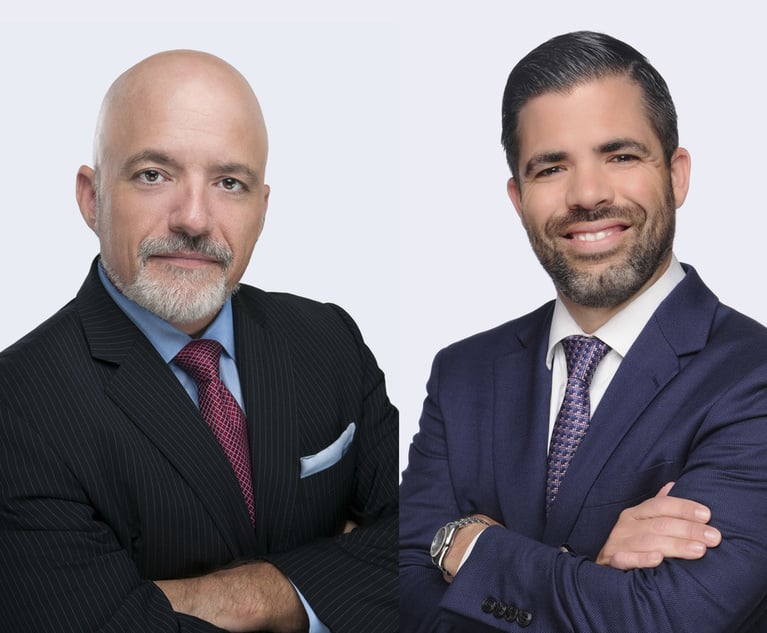Why 'Bristol Myers' Doesn't Apply to Class Actions
Class action defendants are attempting to rewrite longstanding principles of personal jurisdiction, trying to defeat certification of nationwide classes by arguing that a court lacks personal jurisdiction over out-of-state class members' claims where the defendant does not reside in the court's forum state.
July 10, 2018 at 10:00 AM
1 minute read
 Bristol-Myers-Squibb v. Superior Court of California Bristol-Myers Bristol-Myers Chinese-Manufactured Drywall Products Liability Litigation Bristol-Myers Fitzhenry-Russell v. Dr. Pepper Snapple Group, Bristol-Myers Bristol Myers Bristol-Myers Bristol-Myers Bristol-Myers Tal J. Lifshitz is an attorney in Kozyak Tropin and Throckmorton's complex litigation department. He can be reached at [email protected]. Rachel Sullivan is an attorney and of counsel to Kozyak Tropin & Throckmorton's complex litigation department. She can be reached at [email protected].
Bristol-Myers-Squibb v. Superior Court of California Bristol-Myers Bristol-Myers Chinese-Manufactured Drywall Products Liability Litigation Bristol-Myers Fitzhenry-Russell v. Dr. Pepper Snapple Group, Bristol-Myers Bristol Myers Bristol-Myers Bristol-Myers Bristol-Myers Tal J. Lifshitz is an attorney in Kozyak Tropin and Throckmorton's complex litigation department. He can be reached at [email protected]. Rachel Sullivan is an attorney and of counsel to Kozyak Tropin & Throckmorton's complex litigation department. She can be reached at [email protected].This content has been archived. It is available through our partners, LexisNexis® and Bloomberg Law.
To view this content, please continue to their sites.
Not a Lexis Subscriber?
Subscribe Now
Not a Bloomberg Law Subscriber?
Subscribe Now
NOT FOR REPRINT
© 2025 ALM Global, LLC, All Rights Reserved. Request academic re-use from www.copyright.com. All other uses, submit a request to [email protected]. For more information visit Asset & Logo Licensing.
You Might Like
View All



Trending Stories
- 1Fresh lawsuit hits Oregon city at the heart of Supreme Court ruling on homeless encampments
- 2Ex-Kline & Specter Associate Drops Lawsuit Against the Firm
- 3Am Law 100 Lateral Partner Hiring Rose in 2024: Report
- 4The Importance of Federal Rule of Evidence 502 and Its Impact on Privilege
- 5What’s at Stake in Supreme Court Case Over Religious Charter School?
Who Got The Work
J. Brugh Lower of Gibbons has entered an appearance for industrial equipment supplier Devco Corporation in a pending trademark infringement lawsuit. The suit, accusing the defendant of selling knock-off Graco products, was filed Dec. 18 in New Jersey District Court by Rivkin Radler on behalf of Graco Inc. and Graco Minnesota. The case, assigned to U.S. District Judge Zahid N. Quraishi, is 3:24-cv-11294, Graco Inc. et al v. Devco Corporation.
Who Got The Work
Rebecca Maller-Stein and Kent A. Yalowitz of Arnold & Porter Kaye Scholer have entered their appearances for Hanaco Venture Capital and its executives, Lior Prosor and David Frankel, in a pending securities lawsuit. The action, filed on Dec. 24 in New York Southern District Court by Zell, Aron & Co. on behalf of Goldeneye Advisors, accuses the defendants of negligently and fraudulently managing the plaintiff's $1 million investment. The case, assigned to U.S. District Judge Vernon S. Broderick, is 1:24-cv-09918, Goldeneye Advisors, LLC v. Hanaco Venture Capital, Ltd. et al.
Who Got The Work
Attorneys from A&O Shearman has stepped in as defense counsel for Toronto-Dominion Bank and other defendants in a pending securities class action. The suit, filed Dec. 11 in New York Southern District Court by Bleichmar Fonti & Auld, accuses the defendants of concealing the bank's 'pervasive' deficiencies in regards to its compliance with the Bank Secrecy Act and the quality of its anti-money laundering controls. The case, assigned to U.S. District Judge Arun Subramanian, is 1:24-cv-09445, Gonzalez v. The Toronto-Dominion Bank et al.
Who Got The Work
Crown Castle International, a Pennsylvania company providing shared communications infrastructure, has turned to Luke D. Wolf of Gordon Rees Scully Mansukhani to fend off a pending breach-of-contract lawsuit. The court action, filed Nov. 25 in Michigan Eastern District Court by Hooper Hathaway PC on behalf of The Town Residences LLC, accuses Crown Castle of failing to transfer approximately $30,000 in utility payments from T-Mobile in breach of a roof-top lease and assignment agreement. The case, assigned to U.S. District Judge Susan K. Declercq, is 2:24-cv-13131, The Town Residences LLC v. T-Mobile US, Inc. et al.
Who Got The Work
Wilfred P. Coronato and Daniel M. Schwartz of McCarter & English have stepped in as defense counsel to Electrolux Home Products Inc. in a pending product liability lawsuit. The court action, filed Nov. 26 in New York Eastern District Court by Poulos Lopiccolo PC and Nagel Rice LLP on behalf of David Stern, alleges that the defendant's refrigerators’ drawers and shelving repeatedly break and fall apart within months after purchase. The case, assigned to U.S. District Judge Joan M. Azrack, is 2:24-cv-08204, Stern v. Electrolux Home Products, Inc.
Featured Firms
Law Offices of Gary Martin Hays & Associates, P.C.
(470) 294-1674
Law Offices of Mark E. Salomone
(857) 444-6468
Smith & Hassler
(713) 739-1250






